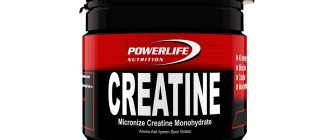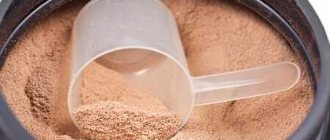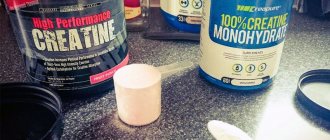What supplement regimens are there? When is the best time to use it and in what dosage. What can you mix creatine with? The benefits of creatine in bodybuilding are beyond doubt. This is a reliable assistant in gaining muscle mass, increasing endurance, increasing strength, and strengthening the immune system. The supplement is available in various forms - capsules, powder or tablets. Of these, the two most convenient forms are tablets and capsules. If we proceed from the position of digestibility, then it is better, of course, to take the powder.
Rules of use
As a rule, most athletes do not know whether to take creatine before or after training, what the dosage should be, whether to take creatine at night, and so on. In general, there are many more questions than answers. But we'll fix it. So, let's look at the main nuances of creatine and its intake:
- What are the schemes? This is where many people fall asleep, because there are two main approaches:
- in the first case, creatine is taken taking into account the so-called loading phase, that is, saturation of the body. This is done as follows. In the first week, you should take five grams of the supplement daily, four times a day. The total daily portion is 20 grams. Time of administration: between meals. If we are talking about days with training, then one serving should be taken immediately after leaving the gym. Further - less. Starting from day 6-7, reduce the portion to 2 grams. In this case, the frequency of administration should be 1 time per day. When should I take it? — In the morning (if it’s a rest day) or after class (if there’s a workout). The duration of the course should not exceed one month, after which a break of several weeks is necessary (usually 3-4 is enough);
in the second case, no loading is expected. It is believed that this option is better and safer for the body. The dosage is 5-6 grams daily. On workout days, creatine should be in your stomach immediately after leaving the gym, and on rest days, before meals. The optimal time of admission is 60 days. After this, it is worth giving the body a short rest - three, or better yet, four weeks.
- When should I take it? Another important question that many athletes cannot decide on is the optimal time to take the supplement. There are opinions floating around online that it is better to take the supplement before working out in the gym. But that's not true. Studies have shown that this approach is the least effective. There are several reasons:
- water metabolism is disrupted, which can lead to significant dehydration of the body. It is absolutely not advisable to allow this to happen;
Before training, the body is configured in such a way that the delivery of nutrients to muscle cells is inhibited. As a result, taking creatine may not bring the expected effect;
- The body expects the arrival of slow carbohydrates before training. Fast carbohydrates are quickly absorbed and can contribute to an increase in body fat. Naturally, there is no need for this;
- muscle fibers do not need creatine during training. They need it after completion, when there is a clear lack of energy.
- What should I take it with? So, with the questions “when?” And How?" we figured it out, and now we can consider the intricacies of combination. Everything is simple here. To improve the absorption of the supplement and speed up insulin secretion, it is advisable to drink creatine along with:
- with fast carbohydrates (you can wash the supplement down with sweet juice or water with sugar);
- with fast protein (helps improve absorption);
- with amino acids.
In both the first and second regimens, it is allowed to take creatine along with other sports nutrition, for example, amino acids, protein or a carbohydrate-protein mixture (gainer).
By the way, using the supplement during exercise is also useless, because it can only complicate the work and slow down the growth of muscle fibers.
Now we can answer the question of when to drink creatine. The answer is exclusively after going to the gym. Moreover, it is advisable to do this within 40-60 minutes. As a rule, this time is most favorable for the body to absorb all the beneficial components of the complex - amino acids, carbohydrates, protein and others.
As for rest days, on these days the supplement can be taken at any time (even at night). By the way, during the loading period it is recommended to drink the last portion before bed. It is believed that taking such a useful component at night allows the supplement to be better absorbed and prepare the body for the training day.
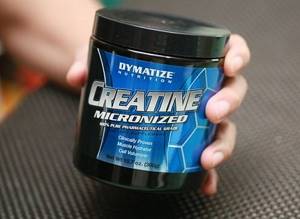
Creatine Monohydrate - Before or After Workout?
So, when should you take Creatine ? The short answer is before and after training . Before your workout, it's wise to prime your muscle cells with this super supplement to reap the benefits early on.
But let's not forget the critical ability to recover post-workout. Although today the old concept of the vital "window" has been abandoned, we cannot argue about the importance of time. This still matters when it comes to making the most of your muscles.
During your workout, your muscles are put to the ultimate test. Now is the time to fuel your muscle fibers with quality energy material to help begin the recovery process. You take another dose of creatine to give your starving muscle cells a powerful boost in their fight for recovery.
Why after? After all, the work has already been done? Taking creatine monohydrate after a workout prepares you for your next workout. There is an old saying that after a workout, you should eat for your next workout, not the one you just finished . If you follow this advice, you will be more than ready for your next challenge.
Optimal time to take creatine[edit | edit code]
The timing of taking creatine immediately before training is not considered the most appropriate time, although many sources recommend it. Firstly, it disrupts water metabolism, since creatine is known to cause dehydration to some extent, which is advisable to avoid during training. Second, pre-exercise metabolism is less predisposed to transport and absorb creatine. Thirdly, before training, it is recommended to take carbohydrates with a low glycemic index, since they supply cells with energy for a long time and in a normal manner, unlike fast carbohydrates, which create a concentration peak of glucose with its deposition in the form of fat. Fourth, the body does not require a fresh supply of creatine during training, since replenished muscle reserves are in a stable state during this time.
It is also not advisable to take creatine during training. In addition, one scientific study showed that taking creatine during training makes it more difficult to perform exercises. This has been attributed to the dehydration state caused by creatine supplementation.
The best time to take creatine is within an hour after exercise, when the metabolic state of skeletal muscle is most receptive to insulin-mediated uptake of creatine. In addition, this time is the most favorable for the consumption of simple carbohydrates, amino acids or quickly digestible protein, which also activate creatine transport by stimulating insulin production. On rest days, the supplement can be taken at any time of the day.
Time to take creatine in relation to food[edit | edit code]
There is no consensus on this matter, since there are arguments in favor of taking creatine before and after meals. Many scientists recommend taking before meals, as food can slow down the absorption and passage of creatine down the gastrointestinal tract, which increases the time creatine remains in the acidic contents of the stomach, and this leads to an increase in the percentage of conversion. On the other hand, food can buffer the acidic environment. However, recently, scientists have definitively proven that creatine monohydrate is slightly destroyed in the acidic contents of the stomach, so food intake does not play a special role. [1]
In 2008, Deldicque L et al conducted a study[2] in which they determined that the absorption of creatine was independent of whether it was taken with food or in its pure form on an empty stomach. In all cases, absorption was almost complete.
Considering that it is advisable to combine creatine with transport systems (amino acids, protein, fast carbohydrates and others), it is better to take it in between meals.
Seluyanov recommended taking creatine at night, as well as vitamins and D-aspartic acid, because all basic processes of regeneration and hormone release occur during sleep.
Creatine with the transport system[edit | edit code]
Creatine with the transport system has its own specific characteristics regarding the time and frequency of administration. So, unlike regular monohydrate, it is better to take it before training, this is due to the fact that it usually contains active substances that are in demand during training. However, variations are possible, so the timing of administration is determined by the specific manufacturer's instructions.
How does creatine work?

Thanks to its beneficial properties and unique composition, creatine helps an athlete increase body weight by increasing strength and increasing cell volume. Other amino acids are involved in its synthesis - arginine, glycine and methionine. How it works?
After the creatine cocktail enters the athlete’s body, active saturation of muscle tissue occurs. Once this natural process is complete, the elements in this dietary supplement begin to be converted into creatine phosphate. It is phosphatocreatine that provokes the appearance of the energy-storing amino acid adenosine triphosphate in the athlete’s body. ATP reserves last for a short period of time, and after it is depleted, creatine phosphate comes to the rescue. This is how the process of ATP resynthesis occurs, which allows the muscles to work for some more time, increasing power.
Thus, thanks to the constant maintenance of ATP activity, the athlete can train for a long time with heavy weights; whereas in the absence of the supplement it quickly fizzles out and weakens. This effect during strength training helps the athlete achieve the effect twice as quickly. “Iron professionals” additionally use creatine for weight loss, increasing muscle mass, and during mass gain.
How much and when to take creatine?
And so, you know you need it. You know when to take it. Now the question is: how much? Total body weight, lean muscle mass, and other factors play a role in dosages, but start at 3 to 5 grams both pre- and post-workout .

Important to note: Don't be one of those guys in the gym locker room who "tops up" with creatine a minute before starting your workout. It's stupid, and here's why. It takes time for the body to first digest any food source, process it, and then distribute it to the desired location in your body (even on an empty stomach).
Be sure to take your pre-workout or sports supplement 30 minutes before your workout . To properly absorb micronutrients to reap all their benefits when they are delivered to their intended destination - the muscles and cells of your body.
Scientific background
Beginners who decide to add creatine to their diet know nothing about this substance and take the words of experienced colleagues in the sports “workshop” for granted. But this approach is fundamentally wrong, because information about the substance is important for every person who decides to take sports nutrition. Here it is worth knowing the results obtained from scientific research.
Taking creatine in combination with training guarantees a synergistic effect, that is, mutual reinforcement of the drugs entering the body. In addition, it has been proven to accelerate muscle power gains, ensure sustained muscle growth and strength gains. Also, thanks to this substance, muscle cells are saturated with water (relevant studies were carried out in 2003).
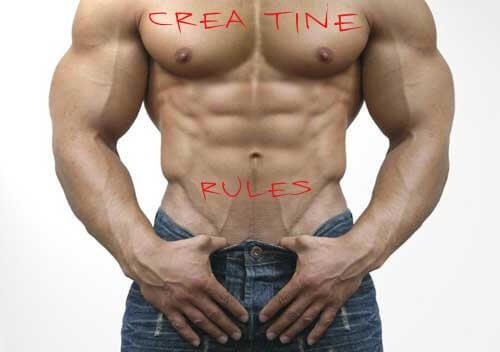
In 2003, an experiment was conducted in which two groups of athletes participated. One took creatine during the training process, and the other did not use this drug. The team that took the supplement experienced a steady increase in muscle mass (25% more than the second group). The experiment was carried out for a month. After receiving supporting data, scientists decided to stop it.
In 2002, a study was conducted in which participants trained using this drug. As a result, the intake provided a stable increase in strength indicators and muscle mass.
The experiments carried out confirmed that creatine works and guarantees the correct effect on the athlete’s body. The negative impact on the functioning of internal organs is minimal.

